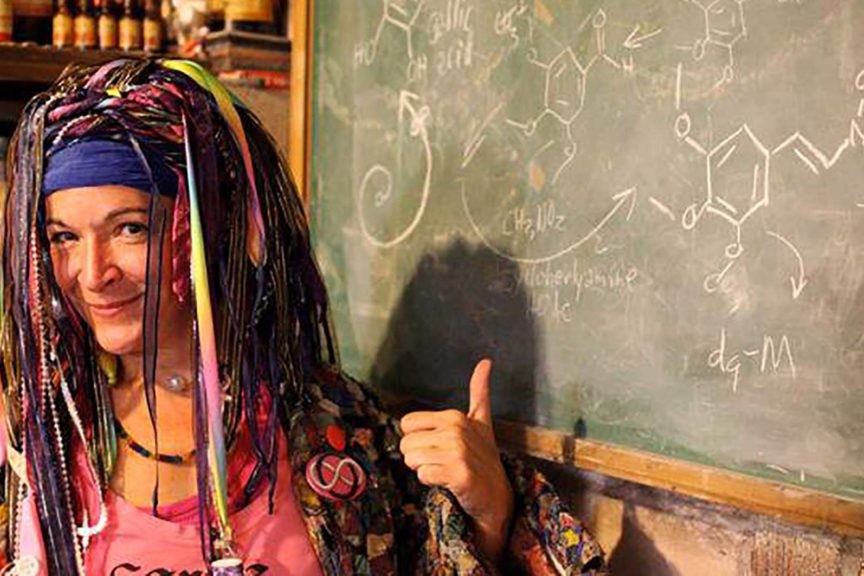Coming Out in Solidarity
Psychedelic users and sexual minorities are both involved in the same struggle. We both represent a valid threat to the same obsolete control mechanisms. We are on the same team.
This is part 6 of the Coming Out of the Psychedelic Closet series. Intro | Part 2 | Part 3 | Part 4 | Part 5 | Conclusion

Psymposia is a 501(c)(3) nonprofit research and media organization that offers critical perspectives on drugs, politics, and culture. We rely on contributions from our readers and listeners. Your support is vital to sustaining Psymposia.
Support Psymposia’s independent journalism on Patreon and help us drive the Mystery Machine! We’re a bunch of meddling kids who are unmasking the latest shenanigans on the psychedelics beat.
In July of 2009, I posted an essay on Erowid.org about the importance of coming out of the psychedelic closet. It was very well received and I was particularly proud of it; so much so that I actually made a video of myself reading it aloud in 2014 and I posted it to my Facebook page on October 11th – which is National Coming Out Day.
I was utterly unprepared for some of the responses I received.
Apparently, a small, but vocal minority of my queer friends were actually offended by what they perceived to be an attempt to forcefully co-opt something that ought rightfully to have been the exclusive provenance of the people who had worked so very hard to establish it. Trying to horn in on the action, I was told, was kind of tasteless at best.
So I meekly backed down and apologized for my unintentional toe stepping, even though a part of me had chafed at being chastised. I wanted to say that Coming Out Day should be as inclusive as possible, in my humble opinion. I see it as an opportunity for members of adjacent communities to express their solidarity and to perhaps develop some greater degree of empathy for the experiences of sexual minorities.
But, then again, I tend to be the sort of person who is more fascinated by what brings people together than by what sets them apart. I suspect that Coming Out Day is the exact sort of thing that can snowball in a truly extraordinary way, if only we allow it to do so. Imagine how the media would react if a big chunk of Silicon Valley suddenly admitted to taking acid fairly regularly; or if millions of formerly closeted atheists were to sign some kind of viral document renouncing their faith. I did not champion these opinions at the time, though – partially because of laziness, but also because it wasn’t P.C. enough.
Nese’s article brought the whole thing back up for me, though. As a married woman who is openly bisexual and polyamorous, I feel like I can legitimately speak to both sides of this issue; though I’ll admit that I’ve had it relatively easy on all counts, since for the most part I live in a fairly progressive little bubble.
Nevertheless, upon searching my heart I have decided to come out as a queer person who thinks that the term “coming out” can be honorably applied to the process of self-exposure undertaken by a psychedelic person when he or she is initially revealing a formerly secretive practice.
I believe that it’s both appropriate and constructive to talk about coming out of the psychedelic closet. The situation of a psychedelic user and the situation a sexual minority member share many obvious parallels.
Of course there are significant differences.
But they are alike in that they both crowd taboos (and sometimes laws) surrounding what is permissible and what is forbidden for us to do with our own bodies. While the risks involved in coming out are indeed asymmetric, I do not think that they are incomparable. It is important to remember that there are still several places in this world where homosexual activity and psychedelic use can both be punishable by death. Vigilance is surely still necessary, but for the most part sodomy laws are happily being phased out.
At least in the United States, where I live, being gay is no longer illegal. (Huzzah!) However, buying, selling, using, or even possessing psychedelics can and often does still lead to lengthy prison sentences. I have lots of gay friends who have been picked on, rejected, discriminated against, and even beaten up because of their orientation. But, while blind eyes have surely been turned, for the most part these abuses are no longer actively sponsored by the state.
I don’t personally know anyone who was ever arrested for being openly gay. I know LOTS of people who have been arrested for the possession of psychedelics, though
I’ve been detained a number of times myself. In fact, if it were not for very good luck and some minor mistakes made on the part of the cops, I’d be in prison right now and not writing this article.
It is true that gay and otherwise openly queer people are much more likely than psychedelic users to be targeted by hate crimes. “Long-haired hippie freaks” have surely ended up on the painful side of a whole lot of beat-downs over the years, but a vast majority of the incidents that I have heard about seem to be perpetrated by straight-identifying males upon what they take to be a more ambiguous-looking male. So, they may actually be stemming from a similar, if not identical, source of tension.
So what is the true source of that tension? This is obviously far too complex of a matter to address in under 1000 words. But, for the most part, I believe that it comes from a very deep-seated mistrust of both the human body and the unconscious mind. The legacy of our cultural evolution has left us deeply repressed and in conflict with our own animal natures. In order to yoke our natural instincts to the wheels that turn the modern machine, the powers of church and state seem to have been intensely bent upon redefining and redesigning human nature itself for at least as long as there have been written records.
There is evidence suggesting that our primitive ancestors may well have been fairly fluid and Bonobo-like, with respect to their sexual practices, and they may also have had close relationships with a variety of psychedelic plants and fungi. But, the same powerful linguistic tools that allow for the rise of, say, agriculture, also admitted the possibility of a new form of mass psychosis. People who can say very complex things can – intentionally or otherwise – construct virally transmissible mythologies that are capable of both proposing a false history and imposing an “ideal” model of human behavior that is more true to the perceived needs of the cultural group at large than it is to the intrinsic qualities of our individual organisms.

Taming our animal instincts is in many ways necessary if even the most primitive of cities is to function harmoniously. We can’t have people murdering one another at a moment’s whim, for instance. Large-scale social regulation is rather difficult to achieve, though. Law and philosophy are not always sufficient to the task.
In order to persuade each person to police their own actions, most cultures end up resorting to what amounts to one Hell of a mindfuck.
Ultimately, a profound shift of human cognitive ratios is required. More weight must be given to signals that originate in the neocortex and our primary urges have to be drastically de-emphasized. In the service of which, the people must be programmed to strongly distrust their own animal instincts. In fact, they must be made to be quite neurotically superstitious.
Sexuality, in particular, has to be very tightly controlled, because, more than anything else that was widely available in the ancient world, sex has the potential to restore our cognitive ratios to their natural settings, thus imperiling the efficacy of the entire control mechanism. Since reproduction is an unavoidable necessity, the narrowest possible allowance must be made for sex between church-and-state sanctioned partners. But, all other sexual expressions up to and including masturbation must be unambiguously demonized. In many cases people have, literally, been taught to believe that their urges are caused by the actions of demons that are out to corrupt them. The whole topic has more often than not been suffused with as much guilt, shame, and fear as it possibly can be.
Our genetic predispositions are a bitch to suppress, though, and most of us do experience drives that are officially unsanctioned from time to time. For gay people, this can be a daily occurrence.
This can and does lead to questioning the dominant paradigm, of course. But, it can also lead to denial, self-hatred, projection, and a dangerous “othering” of those who openly engage in activities that simultaneously appeal to and appall us.
I believe that the prohibition of psychedelics occurs for many of the same reasons. In most times and places, they have either been outright forbidden or they have been under the tightly controlled supervision of some sort of a priestly class who only grant access to them under certain formal, ritual conditions. As things have played out, the rise of psychedelics is occurring at a time when many people are calling our collective value systems into question. There are a number of excellent reasons for this, but I would argue that psychedelics themselves have not played an insignificant role.

We are entering into a new era.
There are fascinating arguments to be had about whether or not the aforementioned shift in our cognitive ratios was truly necessary in order for humanity to have evolved to its current state of complexity. But, it is clear that such a shift is a self-limiting process. Provincial superstitions cannot long endure in today’s cosmopolitan milieu and, indeed, the Earth itself is now endangered by a style of consciousness that stresses abstract ideas over the felt presence of immediate experience.
Psychedelic users and sexual minorities are both involved in the same struggle to transform the body politic on the topic of body politics. We both represent a valid threat to the same obsolete control mechanisms. We are on the same team. We are working together to achieve many of the same goals. We are collectively yearning towards the same future; one that is larger and more compassionate, more respectful towards each individual’s unique identity, more compatible with our true animal nature, more ecologically responsible, and ultimately more appropriate for culturally mature human beings.
We are collectively awakening from the same nightmare of history. We are emerging from the same dark chrysalis and beginning to dry our too-long folded wings in the same hopeful sunlight. We are coming out of the same closet – or at the very least we are coming out of adjacent closets. Let us do so together, as allies in solidarity.
Read the conclusion: Coming Out of the Psychedelic Closet: Final Thoughts
Hey! Before you go… Psymposia is a 501(c)(3) non-profit media organization that offers critical perspectives on drugs, politics, and culture. We strive to ask challenging questions, and we’re committed to independent reporting, critical analysis, and holding those who wield power accountable.
Our perspectives are informed by critical analysis of the systemic crises of capitalism that have directly contributed to the unmitigated growth of addiction, depression, suicide, and the unraveling of our social relations. The same economic elite and powerful corporate interests who have profited from causing these problems are now proposing “solutions”—solutions which both line their pockets and mask the necessity of structural change.
In order for us to keep unpacking these issues and informing our audience, we need your continuing support. You can sustain Psymposia by becoming a supporter for as little as $2 a month.
The Teafaerie
The Teafaerie writes stories, poems, movies, plays and essays, makes videos, organizes flash mobs, and is a frequent writer for Erowid.





